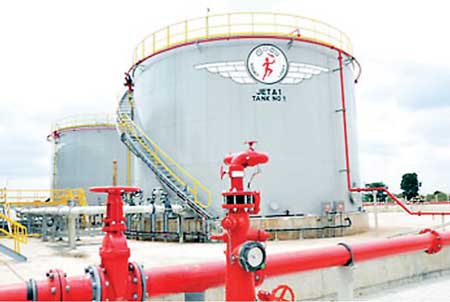Thursday Feb 19, 2026
Thursday Feb 19, 2026
Friday, 12 May 2017 00:07 - - {{hitsCtrl.values.hits}}

Reuters: The State-owned Ceylon Petroleum Corp (CPC) is planning an initial upgrade of its decades-old refinery to produce better grade motor fuels and increase its capacity in a move expected to cost nearly $ 100 million dollars, CPC officials said.
The refinery was originally configured to run on Iranian crude and Sri Lanka had to import more refined oil products after US sanctions caused it to stop crude imports from Iran in 2012. It now runs primarily on Murban crude oil.
The CPC has invited bids to carry out front-end engineering design (FEED) for a new continuous catalyst regeneration (CCR) reformer unit for producing high octane gasoline from heavy naphtha feedstock at its 50,000 barrels-per-day (bpd) Sapugaskanda refinery, according to a tender document.
It is also planning to upgrade the capacity of its crude distillation unit (CDU) to 70,000 bpd from the current 50,000 bpd, and its gasoil hydrotreater to 11,500 bpd from 7,200 bpd.
The refinery, built in the 1960s and the only one in Sri Lanka, is in need of urgent repairs, said CPC Managing Director Nadun Fernando.
“The repair will be done in such a way that there will be minimum impact on the refinery operation, though there could be temporary closure from time to time,” he said.
“The repair will also be done to ensure we do not need to do major changes in the refinery’s repaired sections when we start our real expansion plan.”
The tender for the FEED contract closes on 16 May. The tender may take three to four months to be awarded, another company official told Reuters, declining to be named as he was not authorised to speak with media.
CPC’s plan to partially expand the refinery, which is expected to take 1-1/2 years and cost $ 90 million, will be done with its own funds, Fernando said.
But the company also announced plans last year to double the capacity of the refinery.
This full-fledged expansion and modernisation project is expected to cost $ 2.5 billion, for which it is considering various funding options, Fernando said.
The other official said the cabinet still needed to approve this full expansion to double the capacity of the refinery.
“There are no funds with the Government to do this, so we will have to go for either private sector or external funding.”